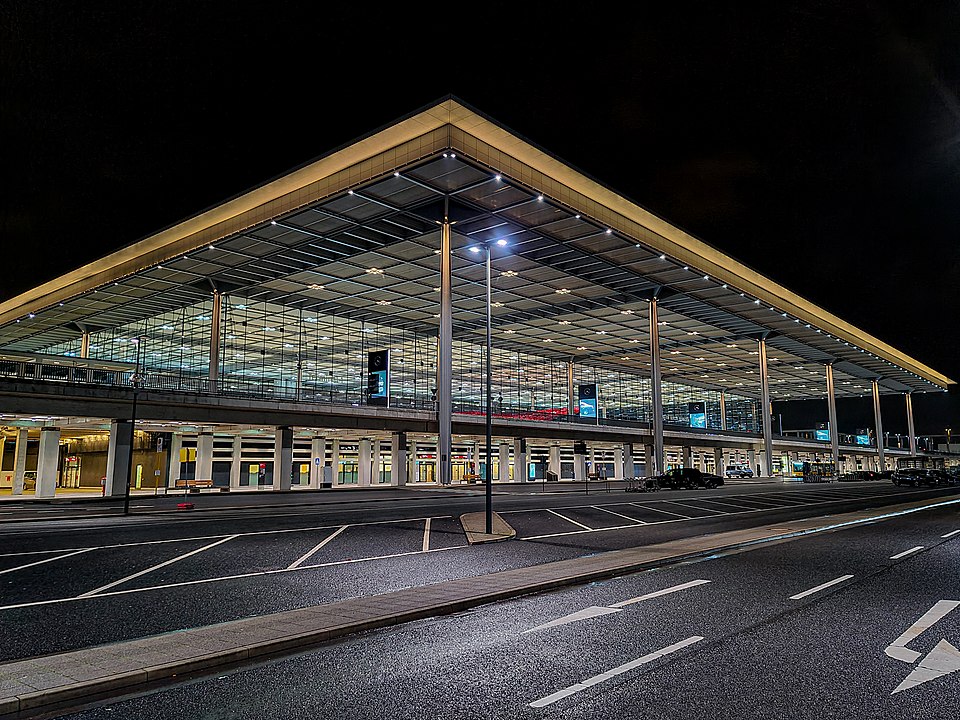
Berlin’s new international airport “BER” entered service on Saturday nine years late and at a time when the aviation sector is suffering the worst crisis in its history due to the pandemic. Lufthansa and Easyjet landed two special flights around 14:00 local time (13:00 UTC), marking the official launch of Willy-Brandt airport in the south-east of the German capital. The first commercial flight, between Berlin and London, took off Sunday.

No big party was planned, the kickoff of the platform was given with few people present because of the health situation but also of the incredible number of problems that hit this great project resulting from the German reunification: failures, poor workmanship, bankruptcies, suspicions of corruption, negligence, resounding resignations.
On Saturday, a hundred demonstrators from various associations for the protection of the environment braved the rain to protest against its opening, under a strong police presence. “The plane represents a huge burden on the climate. We don’t need a new big airport,” said Ludwig Bräutigam, 50, of the environmental collective “Extinction Rebellion” to AFP.
The airport, whose construction began in 2006, should have opened in 2011. It became the laughing stock of all of Germany.
“After so many years, it’s fantastic that BER has become a reality,” the managing director of the low-cost airline Johan Lundgren told DPA.
In 2012, the site was suddenly stopped because the fire safety equipment was not working. The inauguration, scheduled a few weeks later in the presence of Angela Merkel and 10,000 spectators, was hastily cancelled.
Faulty lighting system, escalators too short, planning errors, construction faults, suspicion of corruption … The succession of problems has tarnished Germany’s reputation for efficiency.
Adding insult to injury, the coronavirus crisis means long months of operating at reduced capacity for the country’s third airport, after Frankfurt and Munich.
FFB, the airport operator, counted on 27 million passengers per year for Terminal 1, the only one to open on Saturday. In November, only 20% of normal flight capacity is planned. Terminal 2 won’t open until spring 2021, at best.
Same uncertainty for the commercial spaces of the airport, an important source of income, with many shops and restaurants forced to keep doors closed in November according to the new restrictions decided on Wednesday by the government of Angela Merkel.
The initial cost, estimated at 1.7 billion euros, has already climbed to 6.5 billion. To help the airport and ensure the future of the 20,000 people who will eventually have to work there, the authorities have released 300 million euros in financial aid for the year 2020.
A first passenger plane took off at 06:45 this Sunday morning from the new Berlin airport to London Gatwick. The aircraft of Easyjet (A320neo reg. G-UZHF) took 64 passengers on board.

A total of 23 takeoffs and landings are scheduled for Sunday. By November 7, there will be no regular air operations at Tegel Airport.
Sources: AFP, DPA
Allzeit guten Flug ab #BER wünschen Flughafenchef Engelbert Lütke Daldrup und Stephan Erler, Deutschland-Chef von @easyJet. #helloBER pic.twitter.com/BBEyLkRD44
— BER – Berlin Brandenburg Airport (@berlinairport) November 1, 2020
At 6:45 a.m. today, an easyJet aircraft took off for London Gatwick on the first flight from #BER. Stephan Erler, head of @easyJet Germany and Engelbert Lütke Daldrup, Airport CEO, were on site for the first take-off at Terminal 1. #helloBER
— BER Corporate News (@ber_corporate) November 1, 2020



